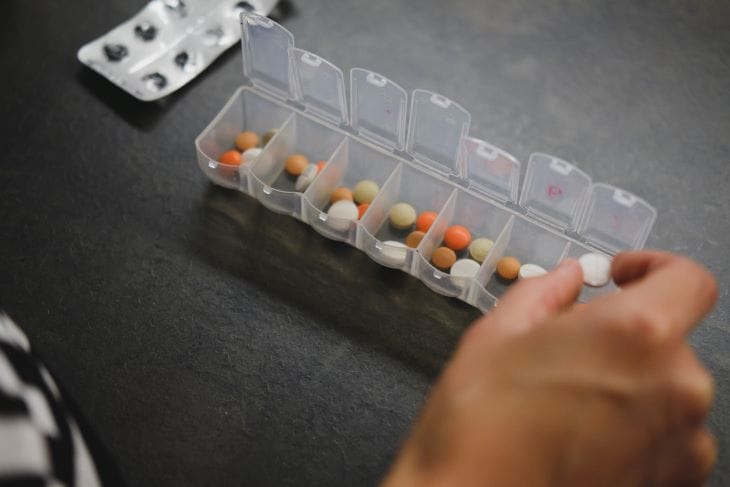Addiction is a complex, misunderstood and often misrepresented mental health condition.
It occurs when an individual consumes an addictive substance regularly and often over a significant period of time, leading their brain chemistry to be altered.
This means that they will continuously seek out the substance, even when it may start to have negative consequences on their life.
Individuals struggling with addiction are at risk of a huge number of effects, and these will vary depending on the specific substance that the individual is addicted to.
One of the most common consequences of substance abuse is the development of a high tolerance towards that substance, which will ultimately cause an addiction to worsen.
There are also behavioural addictions, relating to compulsive behaviours around shopping, sex, gambling and more, but today our focus will primarily be on substance addictions, as these are the addictions to which high tolerance can develop.

In relation to addiction, tolerance is a pharmacological concept in which an individual becomes less and less responsive to the drug (in terms of the physical and mental effects of the substance) as a result of repeated and regular usage.
Some research also suggests that an individual’s development of drug tolerance may be related to environmental stimulants that are present at the time of drug consumption. [1]
When a person’s tolerance increases, they are often driven to use more of an addictive substance in order to experience the same desired effects, worsening their addiction.
Tolerance is an extremely important concept to understand when considering drug addiction, as a build-up of tolerance is often a major contributing factor to an individual’s addictive tendencies, as well as to the secondary effects that an individual may experience as a result of this.

Though an individual’s tolerance will develop differently depending on the drug that they are addicted to – depending on that substance’s specific effects on different parts of the body and mind – there are some key concepts that are understood to generally affect those struggling with addiction.
The effect addiction has on the brain in particular is one of the foundational concepts in the disease model of addiction.
Neurotransmitters are thought to be a driving factor in the development of a tolerance to a substance i.e., the system that transmits different signals around the body to inform it of changes.
One study found that when drug use “evolves from impulsive to compulsive action”, there is a shift in the importance of different neurotransmitters [2] – especially those concerning dopamine, known for its effect on mood and motivation.
This shows how addiction can directly impact the body, often having long-term and negative effects as well as increasing the challenges that an individual may face when they attempt to withdraw from their substance i.e., during detoxification.

Though the basis for biological and chemical tolerance remains the same, there are some slight differences across metabolic, cellular and behavioural factors.
Different individuals will have different reactions to drug use within their body and different substances can cause a wide range of effects, including those which influence an individual’s tolerance to these substances.
These are described in further detail across the following three subheadings.

Metabolic tolerance refers to the body’s ability to break down the substance that has entered the system.
If an individual breaks down the substance that they are consuming at a faster rate than others, for example, then the drug has less time within the body.
Metabolism refers to how quickly a substance is broken down, processed, and removed from the body, meaning that a fast metabolic rate (i.e., having a fast metabolism) equates to the drug being in the system for a shorter period of time.
This could mean that an individual develops a tolerance faster, as their body can process and remove the substance at a faster rate and, therefore, the effects are diminished and the substance may be required in higher quantities to gain the same effect.

Cellular tolerance is that which most closely resembles the general definition of tolerance.
This is because tolerance happens at a cellular level, which influences the overall impact of the substance as well as specific effects on the individual’s metabolism and behaviour.
Despite tolerance occurring as a whole-body process, it is important to understand that tolerance occurs as a change within each individual cell, giving the general effect overall and not just in specific areas of the body.
One study suggests that even if tolerance does not affect every single individual cell, the effects are still generalised within an area and to those cells that may not have been stimulated this way, [3] giving the overall impression of global tolerance within the body.

As the final form of tolerance mentioned in this blog post, behavioural tolerance refers to the individual’s changes in behaviour (or lack of) as a result of prolonged substance use.
As an individual consumes more and more of the substance over time, the behavioural effects of this may become lessened.
This is due to the way in which the body has adapted to deal with increased substance use, able to act as if they were not intoxicated despite the presence of substances in their system.
An example would be someone who is able to maintain their coordination and speech despite ingesting large amounts of alcohol.
This means that the individual will not receive the same effects (both physical and mental) from the substance that they are consuming, and the lack of behavioural impact may cause them to feel the need to consume more and more of the substance to achieve these feelings and behavioural impacts again.

When an individual develops a tolerance to a substance, their body begins to lack the effects and impacts that the substance may have had the first few times that the individual consumed the substance.
This is often dissatisfying and irregular for the individual – they expect and want the effects of the substance to last longer, and this can often lead to irritability and dangerous consumption habits if the individual begins to develop a high level of tolerance.

The pattern of tolerance, addiction, and substance use can quickly become a vicious cycle if the individual does not receive the support and treatment that they need in a suitable period of time.
This is because each part of this cycle leads into the next and often makes it more and more challenging to overcome in the future.
Breaking this cycle as soon as possible is vital for individuals who wish to rehabilitate i.e., learning to resist cravings for addictive substances, which is often the first step during detoxification.
In research, this cycle is often broken down into three stages:
This cycle has been observed to be present in both humans and other animals. [4]

As an individual becomes ‘used to’ the substance that they are consuming i.e., building a tolerance, then the effects of the drug will become lessened.
This is because the body is processing the substance – or is better prepared to process the substance – at a faster rate, meaning that the effects will not last as long or be felt as strongly.

There are some factors that will differ from individual to individual and determine how quickly or slowly someone may develop a tolerance to the substance that they are addicted to.
These will vary depending on the individual, their unique personal factors and, sometimes, the environment in which they reside and therefore the environmental factors that they may be subject to.
The two key categories of factors that influence building tolerance are outlined in the following two subheadings.

As mentioned previously, pre-determined genetic factors can be an influence on an individual’s ability to develop a tolerance.
This has long been researched alongside genetic factors that may make some individuals more likely to develop an addiction to a specific substance than others. [5]
For example, as already outlined, an individual’s metabolism can have a huge impact on how quickly the drug is processed within the body and therefore how quickly it moves through their system.
This is a pre-determined genetic factor that may mean that some individuals’ tolerances are higher or lower than others.

Though an individual’s tolerance is often highly related to their biology and individual genetic makeup, it is also important to consider the other external factors that may influence this.
For example, the environment in which an individual engages in drug-taking behaviour can also be a huge contributor to the individual’s tolerance level.
Studies have found that an individual’s tolerance is often far more measurable and pronounced when the individual is in their usual drug-administering environment [6] as opposed to an alternative environment.

There are some substances that affect an individual’s tolerance differently or in a more specific way.
In general, this is due to the substance’s chemical makeup, whether or not it is physically addictive, as well as the frequency and quantity in which it is consumed.
With opioids, for example, it is generally understood that tolerance develops as a result of changes to the individual’s metabolism, production of different vital enzymes, and alterations to the body’s signalling system. [7]
This shows the dangers of opioids, even if they are used for a short period of time.
As another dangerous substance, the development of a tolerance to alcohol has been massively understudied in regard to sex differences, neuroadaptations, and the reversal of such a tolerance. [8]
This highlights a great need for more research into the modern impact of alcohol addictions, tolerance to alcohol, and other individual differences that may impact this.

As well as causing serious changes to an individual’s mood, behaviour and general well-being, there are also far more risks that an individual must consider if they have developed a tolerance to the substance that they are addicted to.
Having a greater tolerance means that individuals face a range of different physical, mental, social and economic challenges.
Physically, an increased tolerance means that individuals seek out more and more of the substance which, in extreme cases, could lead to an overdose, as well as increasing the impact of the other physical health effects that the specific substance has on the body.
Mentally, an individual is also at risk of increased exposure to the substance that they are addicted to, leading to the development or worsening of any co-occurring mental health issues.
It can also be incredibly wearying to continuously seek a substance that may be difficult or illegal to come by.
Socially, an increased tolerance to substances can cause serious rifts in relationships with those close to the individual, including partners, family and close friends.
Depending on the situation, an individual may require social support, and without it, they will face even more challenges.
Economically, an increased tolerance means that an individual will be consuming greater and greater quantities of the substance which can be incredibly costly.
Due to the illegal nature of many addictive substances treated at drug and alcohol rehab, the costs of this can become even more devastating and individuals may find themselves spending money they do not have as their tolerance and desire to consume the substance grows ever greater.

In all cases of addiction and the development of tolerance, there are certain specialist treatments that may benefit individuals and help them overcome their addiction and tolerance struggles.
These treatments will vary from person to person, as every case of addiction and tolerance is different and will not benefit from a ‘one size fits all’ approach.
In general, the theory of rehabilitation is to lower an individual’s tolerance so that they no longer feel the need to consume the substance that they are addicted to.
Though a low tolerance may seem ideal to many individuals struggling with addiction, in many cases it will be vital that they undergo a detoxification session to withdraw from the substance before progressing to further stages in order to maintain this long into the future.

In some cases of managing tolerance through a detoxification session, it may be necessary to employ some form of medical intervention in order to alleviate the worst of the negative withdrawal symptoms that arise.
This is because withdrawing from a substance requires the individual to stop taking the substance or to slowly transition away from it.
Due to the ways in which an individual’s tolerance affects the body, this can cause discomfort to the individual and, in the cases of physical dependence, can cause life-threatening effects if not properly managed.
Alcohol withdrawal symptoms, for example, are often medically assisted by substances such as Librium which, although it is an addictive substance itself, can seriously reduce the negative consequences that an individual feels during a withdrawal, avoiding dangerous conditions like delirium tremens.
A follow-up detoxification session for Librium would need to be completed in this example.

In all cases of health and well-being, it is always suggested that governments and other charities or agencies should enforce some form of campaign or advertisement against substance abuse.
This is because the best way of treating a condition is always prevention.
Educating individuals on the dangers of addiction and tolerance can help to reduce the dangers that individuals may face as a result of these issues, though this entirely depends on how this information is portrayed and shared – and to whom.
Schools and colleges, for example, often have drug awareness classes and seminars, though the content and message of these programmes can often be lost if not properly implemented.

To summarise, addiction and the development of tolerance to different substances can be incredibly dangerous if the right treatment and information are not found and accessed at the right time.
As both of these phenomena happen on a completely individual basis and no one type of treatment can be recommended to solve all issues, it is vital that individuals seek specific medical support and treatment as soon as they are able to.
Often, those struggling with addiction can express denial and lack of motivation to act on the harmful consequences that may arise, and this is why it is always vital that individuals have suitable and appropriate care in all cases in which it is needed.
As with most research into the field of health, treatments, and medicine, there is a great call for further investigation and a broader range of samples and representations.
If you or someone you know is struggling with addiction, tolerance issues, or any other related concern, then it is vital that you seek support as soon as possible.
This is to avoid any future effects that may arise and to lessen the impact of those that have already arisen.
Our experts can help connect you with professional drug and alcohol rehab services across the UK and beyond, with referrals based on each patient’s unique recovery needs.
Every drug and alcohol rehab facility we recommend is vetted by the Care Quality Commission (CQC) in England and Wales or the Care Inspectorate (CI) in Scotland.
To speak to a member of Rehab 4 Addiction’s addiction support team, call our support line today for free on 0800 140 4690
[1] https://journals.sagepub.com/doi/abs/10.1111/j.0963-7214.2005.00384.x
[3] https://pubmed.ncbi.nlm.nih.gov/8225370/
[4] https://pubmed.ncbi.nlm.nih.gov/19710631/
[6] https://psycnet.apa.org/record/1985-09022-001